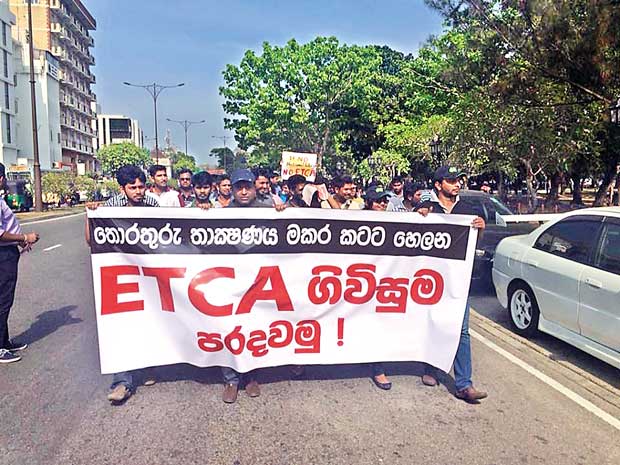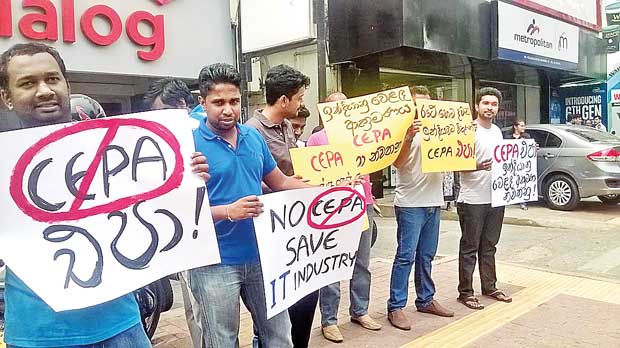Reply To:
Name - Reply Comment
Last Updated : 2024-04-20 11:24:00

The Government is not prosecuting any employer for violating immigration law
Working towards importing labour is also polar opposite to what this Government kept promising
The second is in how very serious policy decisions are made without people
The larger majority thus remains uninterested. That allows for the question, “Who wants a new Constitution?”
Freedom to import labour is different and is a demand from the export oriented manufacturing sector
This is sheer common sense. No law, no bill passed in Parliament without any opportunity for people to feel an ownership to, will even be implemented the right way and efficiently too.

Without people feeling they have a stake in them, there will be no compulsion for the Government and the State agencies to have them implemented independently. It begins with the Constitution and holds true with all important laws and bills like Electoral Reforms, Provincial Councils and power sharing, e-NIC Act, Labour Law reforms, the Audit Bill and others of such importance.
Lack of any interest in society on such laws and bills also says much about the  democratic process in the country.
democratic process in the country.
To date, this Government has not shown any interest in engaging the people in creating important laws and bills brought to Parliament. In making serious policy decisions with people involved and implementing them.
Let me take two serious instances to prove the Government is now “people-less” in all its workings.
The first is the Constitution making process that is without “People”. The much hyped “public consultation” over the new Constitution had no “public consultation”. It was mere collecting of ‘proposals and suggestions’. The Committee appointed was only a “collecting centre”. They received proposals, made a report out of them with their own comments and handed them over to the PM. There was no serious and open public discourse allowed on the proposals received to make it a public consultative process. The Government restricted the drafting process to a Steering Committee in Parliament. Is is not a body representing the people? Does society has social trust on its competency to create a Constitution?
What society is seeing is a mighty haste in Government to have a Constitution passed in Parliament by whatever means possible.
The lack of public participation in drafting the Constitution is being covered by saying the people will vote on the Constitution at a Referendum. That again is not public consultation in creating a Constitution. Referendum is asking the people to consent to a Constitution drafted by a small group and given a two thirds majority in a Parliament that can shift allegiance either way. Absence of “People” in creating their own future Constitution, allows Sinhala Buddhist elements to oppose government’s proposals as anti Sinhala Buddhist, as anti Unitary and with allegations it would pave for separation.
On the flip side, Tamil North is given good reason to reject the draft as inadequate in answering their long standing political grievances.
Around 100,000 young women migrate to the Mid East as house maids annually, instead of seeking employment in BOI approved factories that Upul Jayasuriya said was short of 200,000 workers
The larger majority thus remains uninterested. That allows for the question, “Who wants a new Constitution?” The joint statement by the two high priests of Malwatte and Asgiriya reflects this social ignorance. They would not have had space for such intervention, had the Constitution making process been a ‘people centred’ process.
The second is in how very serious policy decisions are made without people. State Minister of Finance, Eran Wickramaratne went on record to say, the Government is taking steps to remove barriers for employers to import foreign labour.
This is a fundamental change in labour policy. Importing foreign labour is more serious than even working out a new Constitution.
With or without a new Constitution, this is about the economic life of people. It is about “right to livelihood” guaranteed in our Constitution.
Working towards importing labour is also polar opposite to what this Government kept promising.
At the August 2015 elections as UNP leader, Wickremesinghe promised one million jobs to Sri Lankan youth. Again on November 5, 2015 unveiling the Government’s economic strategy in Parliament, PM reiterated the promise of creating one million jobs for Sri Lankans.
Contradicting this promise it is now said, foreign labour would be allowed to be brought in for vacancies available. That policy shift means, all future vacancies could also go for imported labour. This is only because employers ask for cheap and unorganised labour they can exploit to the last copper.
There are over 200,000 foreign workers from mostly India and China at present who are illegally employed by employers.
The Government is not prosecuting any employer for violating immigration law in using illegally brought in foreign labour. Instead what State Minister Eran Wickramaratne says is, the Government will be regularising and legalising presently resorted to illegal importing of labour into the country. Making the ground for such, former Chairman of the BOI-SL Upul Jayasuriya told media in early August 2016, there were over 200,000 job vacancies within BOI approved factories alone. At the same media briefing, Minister Samarawickrama said, industrial zone of the Hambantota Port once in operation would create one million more job opportunities in that region.
The 200,000 vacancies former BOI Chairman spoke about and these millions of job opportunities promised are not vacancies for professionals.
Contracting foreign “professionals” that State Minister Eran Wickramaratne said would be possible once legal issues are cleared, is just plain bluff.
Foreign professionals are required rarely and can be employed even today, if employers can justify their necessity. Protests against the CEPA (Comprehensive Economic Partnership Agreement) and the ETCA (Economic and Technology Cooperative Agreement) were not totally based on professionals coming into Sri Lanka.
It was more because local producers feared to compete with Indian products that could come to the local market. Both the Rajapaksa Government then and the present Yahapalana Government avoid social dialogue on these issues. It is social ignorance that allows continued opposition to these bi-lateral proposals.
Freedom to import labour is different and is a demand from the export oriented manufacturing sector.
They were asking for this freedom from President Rajapaksa too, who was hesitant, not because of professional protests against CEPA, but because it could affect his vote bank.
There was a feeling among his own close confidantes, large numbers of foreign labour in the country could be interpreted as stealing “our jobs”. The Trumpian argument so to say, one hears against immigrants in the US and in European countries.
Importing of labour from countries like India, Bangladesh, China and Myanmar, is argued on shortage of labour for the apparel and other manufacturing industries.
There is no dialogue and discussions on this issue with relevant Trade Unions before policy decisions are taken. There is no dialogue as to why there is a shortage of labour for these sectors. Active TUs like the FTZ and General Services Employees’ Union has raised different issues as reasons for shortage of labour. In all FTZ factories counting around 300 and in other BOI approved factories that may total to about 2,700 in all, female workers total over 70 per cent. It can be over 80 per cent in the apparel sector.
There is an unanswered question here. Around 100,000 young women migrate to the Mid East as house maids annually, instead of seeking employment in BOI approved factories that Upul Jayasuriya said was short of 200,000 workers.
Why don’t these young women consider employment in these factories? Why do they prefer Mid East employment as house maids, ignoring all adverse publicity about working conditions in the Mid East?
The FTZ trade union argues it is all about establishing decent workplaces with labour rights honoured, an undertaking the Government has given the EU in accepting EU GSP “Plus” benefits. Can this Government honour EU GSP “Plus” conditions with imported labour?
As much as politicians and other policymakers, the local business community too is old fashioned and backward. There is this contradiction where Sri Lanka is being flaunted as a “hi-tech” hub while the local management outlook is ancient. They still believe in employing men and women who could be ordered around as paid slaves. They don’t understand that we live in a modern civilised world where improving production through modern management and collaborative practices that allow for an efficient, satisfied labour force is the accepted norm.
In simple language, what State Minister Wickramaratne is making way for, are demands of a primitive business community, which does not want to honour labour laws, workers’ rights and fundamental rights enshrined in our Constitution and established through ILO Conventions 87 and 98.
Conventions this country is signatory to and have been ratified. All that a civilised, modern world believes should be guaranteed without discrimination.
Worst is the fact, which this manufacturing industry is provided with special infrastructure facilities, tax holidays, tax waivers, tax concessions at the expense of Sri Lankans. What State Minister Wickramaratne says is, Sri Lankan taxpayers’ money will go to provide jobs to those in neighbouring countries, because that’s what investors want. In essence, this Government would provide what investors want and not what people want. Sadly, the past 40 years has proved, this investor approach has not developed the country for the people of the country.
From the Constitution to all legislation and to policy decisions, what is very apparent is, everything without social dialogue, ultimately goes against the people. It is this factor that erodes public trust this Government gained at the last August 2015 elections and is held against the Government as breaking all election promises. It is not just accountability and transparency in governance that matters. It is giving democracy a functional importance with people’s participation that matters most. Democracy without people is freedom of exploitation and freedom of looting a nation.

Add comment
Comments will be edited (grammar, spelling and slang) and authorized at the discretion of Daily Mirror online. The website also has the right not to publish selected comments.
Reply To:
Name - Reply Comment
On March 26, a couple arriving from Thailand was arrested with 88 live animal
According to villagers from Naula-Moragolla out of 105 families 80 can afford
Is the situation in Sri Lanka so grim that locals harbour hope that they coul
A recent post on social media revealed that three purple-faced langurs near t